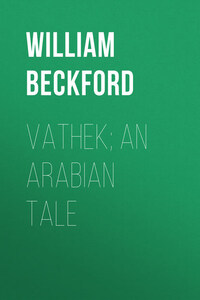William Beckford, the author of the following celebrated Eastern tale, was born in 1760, and died in the spring of 1844, at the advanced age of eighty-four years. It is to be regretted, that a man of so remarkable a character, did not leave the world some record of a life offering points of interest different from that of any of his contemporaries, from the peculiarly studious retirement and eccentric avocations in which it was chiefly passed. Such a memoir would have formed a curious contrast with that of the late M. de Chateaubriand, who, born nearly at the same period, outlived but by a few years, the strange Englishman, whose famous romance forms a brilliant ornament to French literature, which even Atala is unlikely to outlive in the memory of Chateaubriand’s countrymen. All men of genius should write autobiographies. Such works are inestimable lessons to posterity. As it is, there are few men, of whom it is more difficult to compose an elaborate and detailed history than the author of “Vathek.” From such scanty sources as are open to us, the reader must be content with a few striking facts and illustrations, which may serve to convey some idea of the idiosyncrasy of a man, whose whole life was a sort of mystery, even to his personal acquaintances.
His great-great-grandfather was lieutenant-governor and commander of the forces in Jamaica; and his grandfather president of the council in the same island. His father, though not a merchant, as has been represented, but a large landed proprietor, both in England and the West Indies, was lord mayor of London, and distinguished himself in presenting an address to the king, George the Third, – by a spirited retort to his majesty, – who had the ill-breeding to treat discourteously a deputation which the lord mayor headed. The portraits of Alderman Beckford, and his more celebrated son, were painted by Sir Joshua Reynolds. The former died in 1770, leaving the subject of this memoir the wealthiest commoner in England.
No pains were spared on the education of the young Croesus – the lords Chatham and Camden being consulted by his father on that subject. Besides Latin and Greek, he spoke five modern languages, and wrote three with facility and elegance. He read Persian and Arabic, designed with great skill, and studied the science of music under the great Mozart.
At the age of eighteen he visited Paris, and was introduced to Voltaire. “On taking leave of me,” said Beckford, “he placed his hand on my head, saying, ‘There, young Englishman, I give you the blessing of a very old man.’ Voltaire was a mere skeleton – a bony anatomy. His countenance I shall never forget.”
His first literary production, “Memoirs of Extraordinary Painters,” was written at the early age of seventeen. It would appear, that the old housekeeper at Fonthill, was in the habit of edifying visitors to its picture gallery by a description of the paintings, mainly derived from her own fertile imagination. This suggested to our author, the humorous idea of composing a catalogue of suppositious painters with histories of each, equally fanciful and grotesque. Henceforward, the old housekeeper had a printed guide (or rather, mis-guider) to go by, and could discourse at large on the merits of Og of Bashan! Waterslouchy of Amsterdam! and Herr Sucrewasser of Vienna! their wives and styles! As for the country squires, etc., “they,” Beckford tells us, “took all for gospel.”
“Vathek,” – the superb “Vathek,” which Lord Byron so much admired, and on which he so frequently complimented the author, – “Vathek,” the finest of Oriental romances, as “Lallah Rookh” is the first of Oriental poems, by the pen of a “Frank,” was written and published before our author had completed his twentieth year, it having been composed at a single sitting! Yes, for three days and two nights did the indefatigable author persevere in his task. He completed it, and a serious illness was the result. What other literary man ever equalled this feat of rapidity and genius?
“Vathek” was originally written in French, of which its style is a model. The translation which follows, is not by the author himself, though he expressed perfect satisfaction with it. It was originally published in 1786. For splendour of description, exquisite humour, and supernatural interest and grandeur, it stands without a rival in romance. In as thoroughly Oriental keeping, Hope’s “Anastasius, or Memoirs of a Modern Greek,” which Beckford himself highly admired, can alone be compared with it.
Much of the description of Vathek’s palace, and even the renowned “Hall of Eblis,” was afterwards visibly embodied in the real Fonthill Abbey, of which wonders, almost as fabulous, were at one time reported and believed.
Fonthill Abbey, which had been destroyed by fire, and re-built during the life-time of the elder Beckford, was on account of its bad site demolished, and again re-built under the superintendence of our author himself, assisted by James Wyatt, Esq., the architect, with a magnificence that excited the greatest attention and wonder at the time. The total outlay of building Fonthill, including furniture, articles of virtu, etc., must have been enormous, not much within the million, as estimated by the “Times.” A writer in the “Athenæum” mentions £400,000 as the sum. Beckford informed Mr. Cyrus Redding, that the exact cost of building Fonthill was £273,000.









